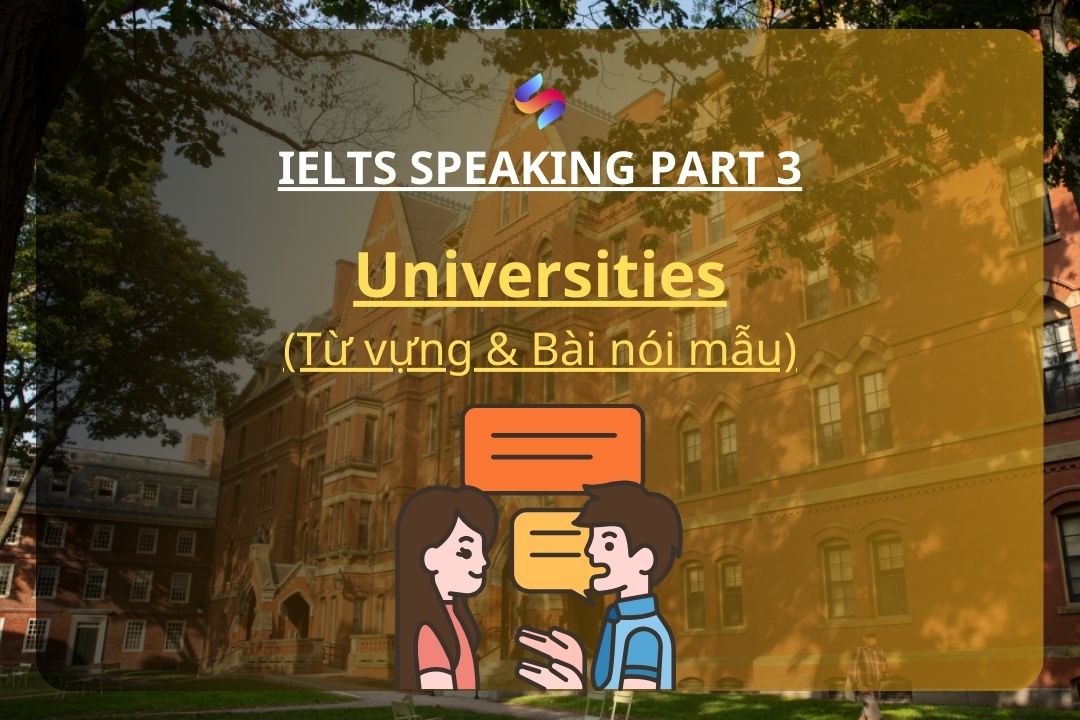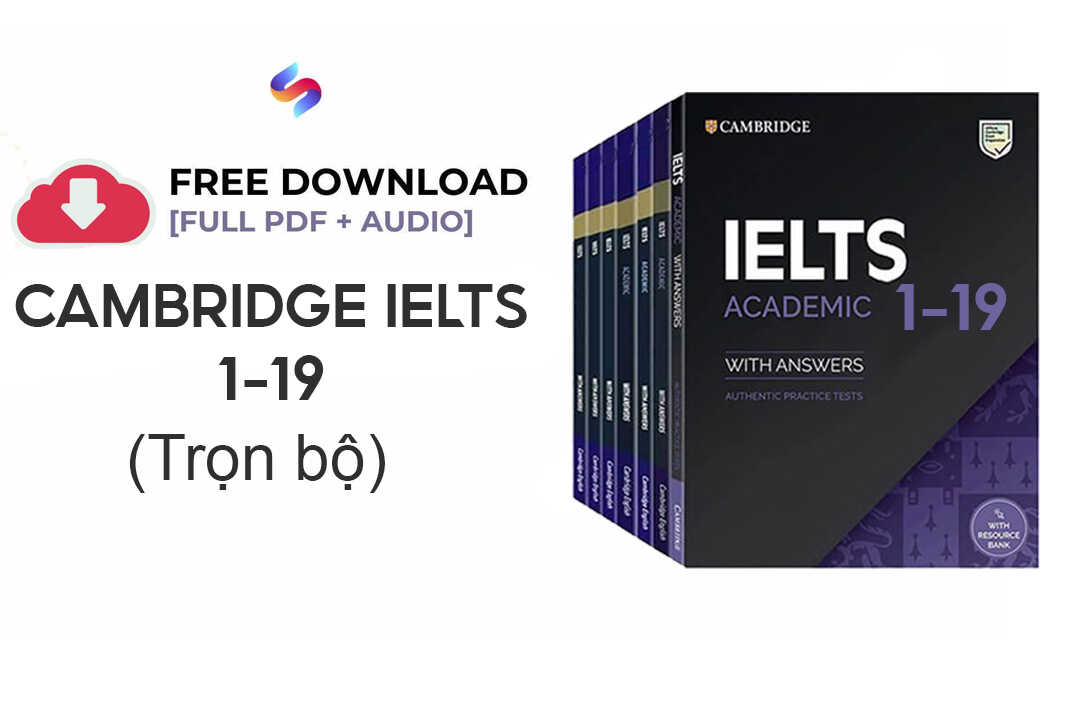Đội ngũ chuyên gia tại Smartcom English là tập hợp những chuyên gia đầu ngành trong lĩnh vực IELTS nói riêng và tiếng Anh nói chung. Với phương pháp giảng dạy sáng tạo, kết hợp với công nghệ AI, chúng tôi mang đến những trải nghiệm học tập độc đáo và hiệu quả. Mục tiêu lớn nhất của Smartcom Team là xây dựng một thế hệ trẻ tự tin, làm chủ ngôn ngữ và sẵn sàng vươn ra thế giới.
Chủ đề Universities (các trường đại học) liên quan đến nhiều khía cạnh của giáo dục đại học, bao gồm chi phí, vai trò của các trường đại học trong xã hội, và sự cân bằng giữa nghiên cứu và giảng dạy. Khi trả lời các câu hỏi về chủ đề này, bạn cần có khả năng phân tích các vấn đề liên quan đến giáo dục, cung cấp các lập luận hợp lý và sử dụng từ vựng phù hợp để giải thích quan điểm của mình.

Câu hỏi mẫu thường gặp
● Is higher education too expensive in your country?
● Should all students pay for their university education?
● What advantages do universities bring to society?
● Which is more important, research or teaching?
● How should students spend their summer vacations?
● Should all students pay for their university education?
● What advantages do universities bring to society?
● Which is more important, research or teaching?
● How should students spend their summer vacations?
Câu hỏi: Is higher education too expensive in your country?
(Giáo dục đại học có quá đắt đỏ ở quốc gia của bạn không?)
Mẫu câu trả lời:
“Yes, higher education can be quite expensive in my country, particularly for students who attend private universities. The cost of tuition, combined with additional expenses such as textbooks, accommodation, and other fees, can place a significant financial burden on students and their families. While public universities offer more affordable options, the increasing cost of education remains a concern. This situation often leads to debates about the need for more government support and the introduction of financial aid programs to make education more accessible.”
Phân tích câu trả lời:
- Mở đầu: Nhận định về chi phí giáo dục đại học.
- Phát triển: Liệt kê các yếu tố đóng góp vào chi phí cao và tác động của chúng.
- Kết luận: Đề xuất giải pháp hoặc thảo luận về sự cần thiết của hỗ trợ tài chính.
Vocabulary ghi điểm:
- Financial burden /faɪˈnænʃəl-ˈbɜːrdən/: (noun) gánh nặng tài chính
- Tuition fees /tjuˈɪʃən-fiːz/: (noun) học phí
- Financial aid programs /faɪˈnænʃəl-eɪd-ˈprəʊɡræmz/: (noun) chương trình hỗ trợ tài chính
Câu hỏi: Should all students pay for their university education?
(Tất cả học sinh có nên trả tiền cho việc học đại học của họ không?)
Mẫu câu trả lời:
“The question of whether all students should pay for their university education is complex. On one hand, having students contribute financially can help fund the quality of education and facilities. On the other hand, making education accessible regardless of financial background is crucial for ensuring equal opportunities. Therefore, I believe that while some level of financial contribution may be necessary, there should also be robust scholarship and financial aid systems in place to support those who cannot afford to pay.”
Phân tích câu trả lời:
- Mở đầu: Nêu vấn đề về việc học sinh có nên trả tiền học đại học.
- Phát triển: Đưa ra các lập luận ủng hộ và phản đối.
- Kết luận: Đề xuất các biện pháp hỗ trợ tài chính hợp lý.
Vocabulary ghi điểm:
- Equal opportunities /ˈiːkwəl-ˌɒpəˈtjuːnɪtiz/: (noun) cơ hội bình đẳng
- Robust scholarship /roʊˈbʌst-ˈskɒlɑːrʃɪp/: (noun) học bổng vững chắc
- Financial contribution /faɪˈnænʃəl-ˌkɒntrɪˈbjuːʃən/: (noun) sự đóng góp tài chính
Câu hỏi: What advantages do universities bring to society?
(Các trường đại học mang lại những lợi ích gì cho xã hội?)
Mẫu câu trả lời:
“Universities play a pivotal role in society by providing advanced education and fostering research and innovation. They contribute to the development of a skilled workforce, which is essential for driving economic growth and addressing societal challenges. Additionally, universities often serve as centers of cultural and intellectual exchange, promoting social cohesion and a deeper understanding of diverse perspectives. Their role in nurturing future leaders and thinkers also underscores their importance in shaping a progressive and informed society.”
Phân tích câu trả lời:
- Mở đầu: Mô tả vai trò quan trọng của các trường đại học.
- Phát triển: Liệt kê các lợi ích mà các trường đại học mang lại cho xã hội.
- Kết luận: Nhấn mạnh sự quan trọng của các trường đại học trong việc phát triển xã hội.
Vocabulary ghi điểm:
- Pivotal role /ˈpɪvətl-roʊl/: (noun) vai trò then chốt
- Skilled workforce /skɪld-ˈwɜːrkfɔːrs/: (noun) lực lượng lao động có kỹ năng
- Intellectual exchange /ˌɪntəˈlɛktʃuəl-ɪksˈʧeɪndʒ/: (noun) sự trao đổi trí thức
- Cultural cohesion /ˈkʌltʃərəl-koʊˈhiːʒən/: (noun) sự gắn kết văn hóa
Câu hỏi: Which is more important, research or teaching?
(Nghiên cứu hay giảng dạy quan trọng hơn?)
Mẫu câu trả lời:
“Both research and teaching are integral components of a university’s mission, and their importance can vary depending on the context. Research drives innovation and advances knowledge, which can lead to significant societal benefits and technological breakthroughs. Teaching, on the other hand, is fundamental for imparting knowledge and skills to students, preparing them for professional careers. Ideally, a balance should be maintained between research and teaching, as both contribute uniquely to the academic and practical development of students and society.”
Phân tích câu trả lời:
- Mở đầu: So sánh vai trò của nghiên cứu và giảng dạy.
- Phát triển: Giải thích sự quan trọng của từng yếu tố.
- Kết luận: Đề xuất sự cân bằng giữa nghiên cứu và giảng dạy.
Vocabulary ghi điểm:
- Integral components /ˈɪntɪɡrəl-kəmˈpoʊnənts/: (noun) các yếu tố không thể thiếu
- Technological breakthroughs /ˌtɛknəˈlɒdʒɪkəl-ˈbreɪkθruːz/: (noun) những đột phá công nghệ
- Imparting knowledge /ɪmˈpɑːrtɪŋ-ˈnɒlɪdʒ/: (noun) truyền đạt kiến thức
Câu hỏi: How should students spend their summer vacations?
(Sinh viên nên dành thời gian nghỉ hè như thế nào?)
Mẫu câu trả lời:
“Students should utilize their summer vacations in ways that enhance their personal and professional development. Engaging in internships or part-time jobs can provide valuable work experience and practical skills that complement academic learning. Additionally, taking time for personal growth activities such as traveling or learning new skills can broaden their horizons and improve their overall well-being. Balancing relaxation with productive activities ensures that summer breaks are both enjoyable and beneficial for their future aspirations.”
Phân tích câu trả lời:
- Mở đầu: Đưa ra cách sử dụng thời gian nghỉ hè hiệu quả.
- Phát triển: Liệt kê các hoạt động có thể thực hiện và lợi ích của chúng.
- Kết luận: Nhấn mạnh sự cần thiết của việc cân bằng giữa nghỉ ngơi và hoạt động hữu ích.
Vocabulary ghi điểm:
- Enhance personal and professional development /ɪnˈhæns-ˈpɜːrsənl-ənd-prəˈfɛʃənl-dɪˈvɛləpmənt/: (noun) nâng cao sự phát triển cá nhân và nghề nghiệp
- Internships /ˈɪntɜrnʃɪps/: (noun) thực tập
- Broaden horizons /ˈbrɔːdn-həˈraɪzənz/: (verb) mở rộng tầm nhìn
- Productive activities /prəˈdʌktɪv-ækˈtɪvɪtiz/: (noun) các hoạt động hiệu quả
Xem thêm: IELTS Speaking part 3: Chủ đề Leadership and Politics
Hy vọng bài viết này sẽ giúp bạn chuẩn bị tốt hơn cho phần thi IELTS Speaking Part 3 về chủ đề Universities. Việc hiểu rõ các khía cạnh liên quan đến giáo dục đại học và sử dụng từ vựng chính xác sẽ giúp bạn cải thiện khả năng giao tiếp và đạt được điểm số cao trong kỳ thi.
Nếu bạn đang phân vân nên học IELTS ở đâu để được hướng dẫn bài bản các kỹ thuật này, hoặc đang tìm hiểu về chi phí học IELTS, thì Smartcom English chính là lựa chọn đáng cân nhắc. Với đội ngũ giảng viên bản ngữ cùng các cựu du học sinh dày kinh nghiệm, Smartcom cam kết đồng hành cùng bạn chinh phục mục tiêu IELTS một cách hiệu quả và tiết kiệm.
Kết nối với mình qua
Bài viết khác


![[PDF + Audio] Tải Sách IELTS Cambridge 19 (Kèm đáp án)](https://smartcom.vn/blog/wp-content/uploads/2024/06/ielts-cambridge-19_optimized.png)


![[PDF + Audio] Tải Sách IELTS Cambridge 17 (Kèm đáp án)](https://smartcom.vn/blog/wp-content/uploads/2024/07/sach-ielts-cambridge-17_optimized.jpg)

![[PDF + Audio] Tải Sách IELTS Cambridge 15 (Kèm đáp án)](https://smartcom.vn/blog/wp-content/uploads/2024/07/ielts-cambridge-15_optimized.jpg)








